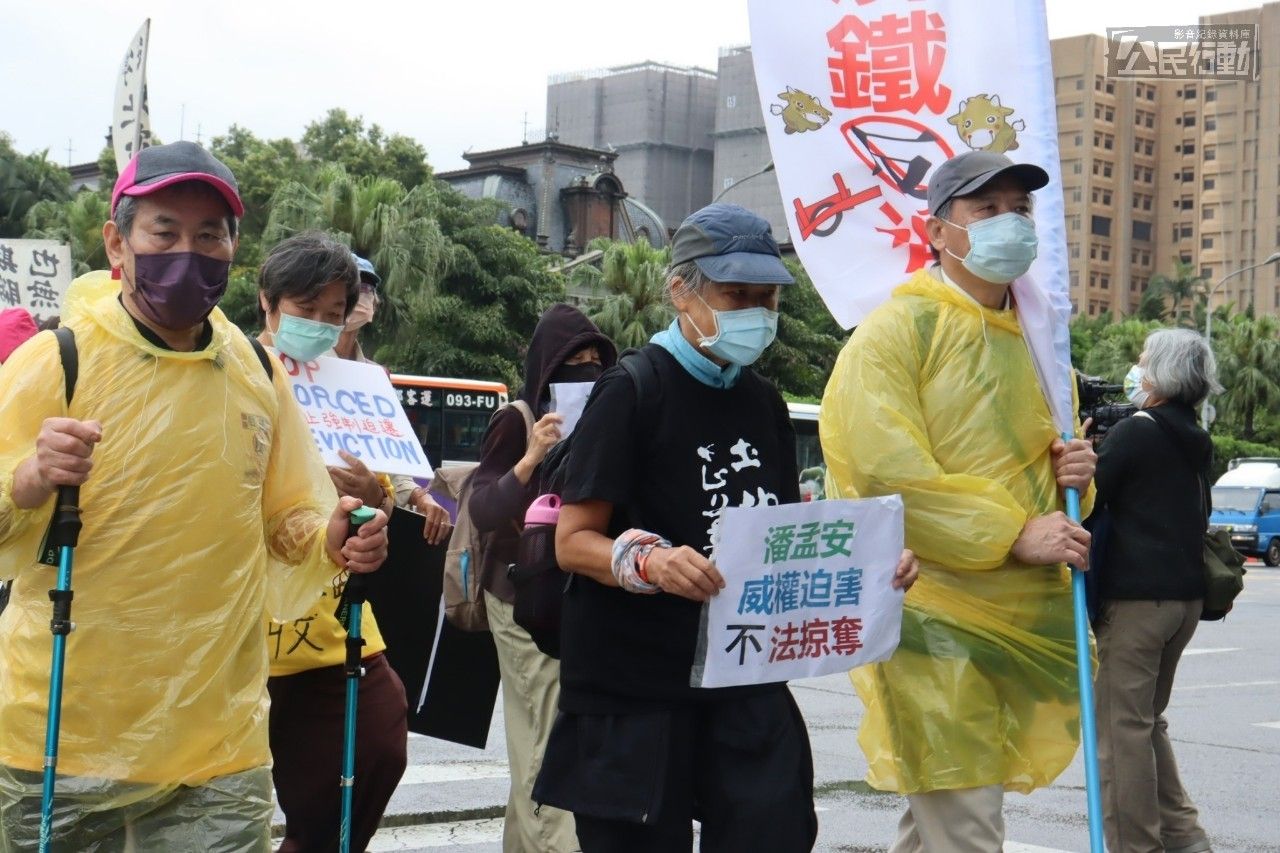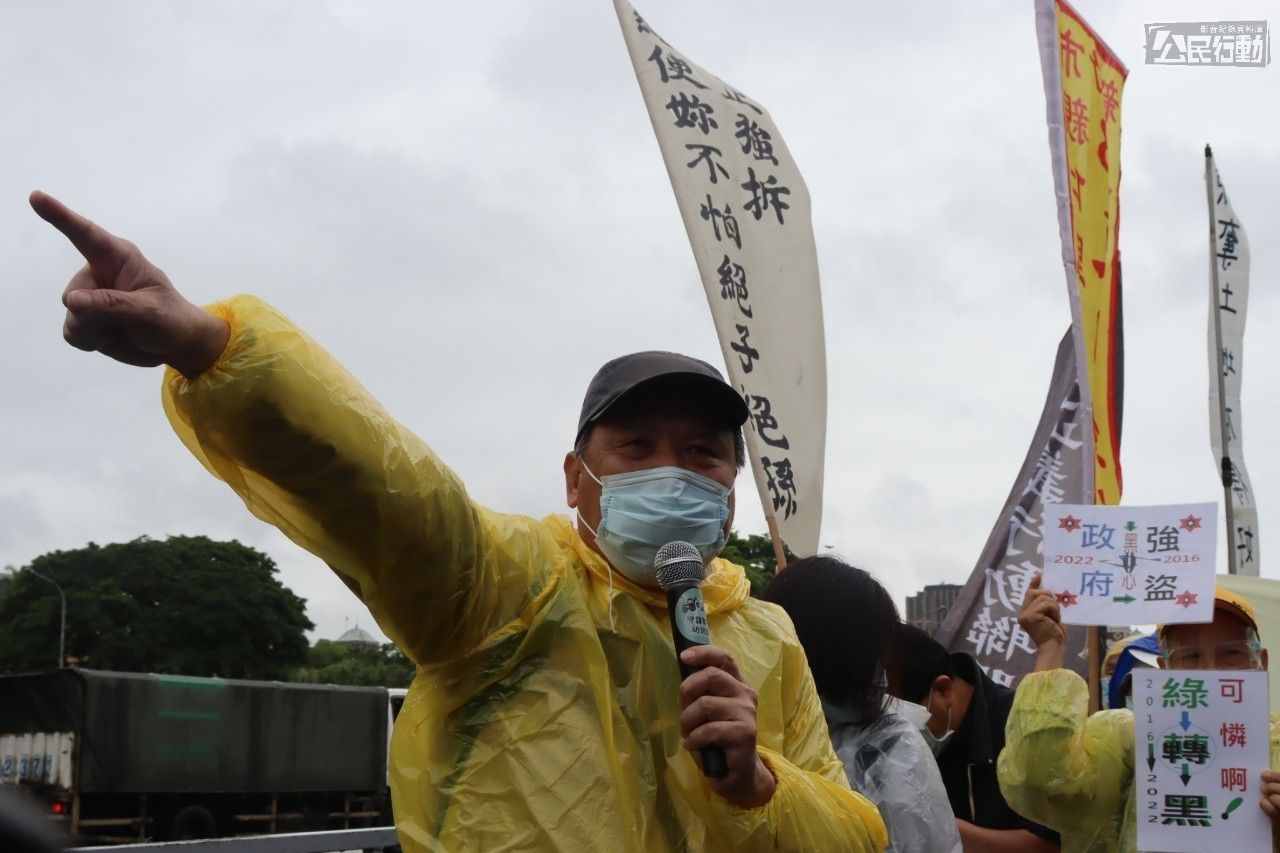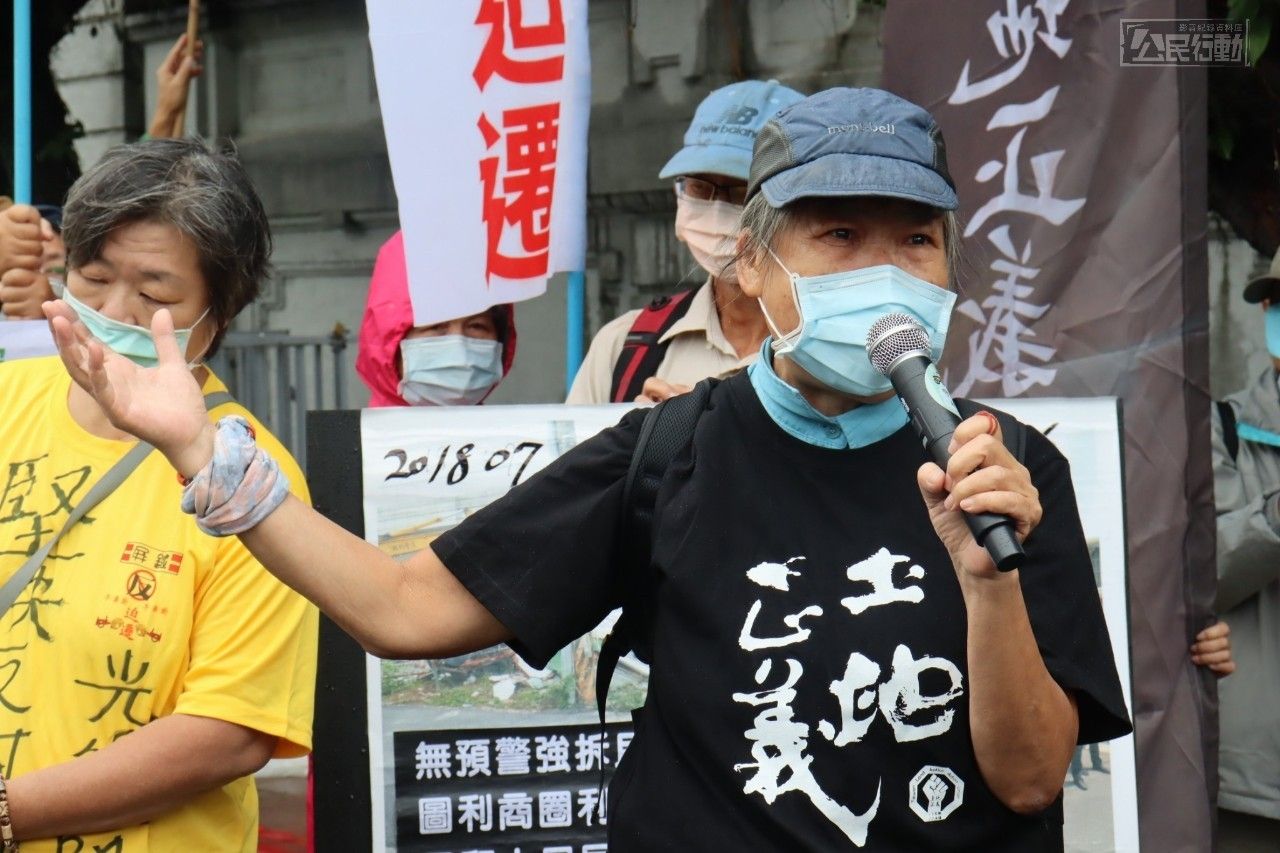No forced evictions in Taiwan? Local groups take to the streets to support the Pingtie case

Text / Gongku reporter Hong Yuzeng
"Stop land plundering! Stop forced evictions!" The Taiwan Land Justice Action Alliance and various anti-forcible eviction groups held a press conference in Kaidao yesterday (5/16). At that time, the Ministry of the Interior made remarks to the international committee members that "there are no cases of forced eviction in Taiwan", which aroused dissatisfaction among anti-forcible eviction groups across Taiwan.
In particular, the Public Works Office of Pingtung County Government won the bid for the tender project for the "Demolition Project on Guangfu Road and Liuzhou Street Road around Pingtung Railway Station (West Side)". The local residents were worried about the danger of forced demolition at any time. Beishang made a petition, confirming that "Taiwan still has an imminent forced eviction case", and appealed for the preservation of the original house in the same place.
After the press conference, the protesters marched to the front of the Presidential Palace, and were led by Xu Shirong, honorary chairman of the Land Justice Action Alliance and professor of the Department of Land Affairs at Zhengda University, Lin Baolian, the representative of Pingtie's anti-forcible evictions, and Li Huaping, a spokesperson for the Shezidao Self-Rescue Association. Move group petition letters, etc., and enter the presidential palace to petition.

No forced evictions in Taiwan? What are the disputes over the years?
"If the abolition of martial law is taken as the time point, the area of land expropriated after the 1976 Republic of China is far more than the area under the DPP's rule!" Xu Shirong criticized the DPP who claimed to "identify with the mainland" and "love Taiwan" The party, after taking power, has not stopped the practice of forced evictions. Many forced evictions live below the "human rights floor", worrying about life being displaced, as if living in hell.
In particular, last week, international members came to Taiwan to conduct a "Review Conference on the Two Human Rights Covenants" on issues such as forced evictions and human rights, and made relevant conclusions and recommendations. The so-called "two human rights covenants" refer to the "International Covenant on Civil and Political Rights" and the "International Covenant on Economic, Social and Cultural Rights". The two covenants originated from the United Nations and together with the United Nations Universal Declaration of Human Rights are known as the "International Code of Human Rights". ". Countries abide by the relevant human rights norms through the "two human rights covenants". Taiwan also announced the "International Covenant on Civil and Political Rights and the International Covenant on Economic, Social and Cultural Rights Implementation Law" in April 2009, which clearly stipulates the protection of human rights.
However, during the meeting, the Ministry of the Interior actually told the international members that there were no forced eviction cases in Taiwan and that the government had good communication with the public. Chen Zhixiao, the former chairman of the Land Justice Action Alliance, gave examples of forced eviction cases in various places, including the forced eviction case of Xu Suhua in the Sanchongdu relocation case, and the forced eviction case of the Tainan Railway East. It shows that there are still many forced eviction cases in Taiwan. Chen Zhixiao criticized the government for expropriating land from the people through various projects, and then changing the land and selling it to a consortium for development and utilization.

In addition, since the review meeting of the two human rights covenants in January 2017, this meeting is also the second visit of the international committee to Taiwan after five and a half years. Xu Shirong pointed out that points 51 to 53 of the conclusions of the review conference are related to "housing and land rights", which is the so-called forced eviction issue. Point 51 even mentioned that the committee had raised many suggestions and questions on the issue of land expropriation during its review five years ago.
"This means that the conclusions put forward by the International Committee five and a half years ago were ignored. At that time, the government of the Republic of China was asked to stop land grabbing and forced evictions, but the government has done nothing for five and a half years!" Xu Shirong criticized, five and a half years ago President Tsai Ing-wen also personally promised that the opinions provided by the international committee will be regarded as the "floor of human rights", not the "ceiling". Unfortunately, forced eviction cases have emerged one after another over the years. Human rights protection.
The looming screen iron case, residents demanded to keep the original house in place
The issue of forced eviction is rife all over Taiwan, and the Pingtie case, which has recently passed the bidding for the demolition project, is even more urgent. The "Pingtung Railway Elevation Case" is related to the Pingtung Railway Station Railway Elevation Project, which originated from the Pingtung Urban Plan's "Pingbei Railway Elevation Project". In addition to the elevated construction of the railway station, the county The government expects to acquire land and widen roads around the railway station, including Guangfu Road, Liuzhou Street, Jianmin Road, and Gongyong Road.
In the past, five households of anti-forcible evictions, headed by Guangfu Road, Liuzhou Street and Jianmin Road, filed a lawsuit with the Ministry of the Interior and the Pingtung County Government through administrative litigation. On the 24th, the Supreme Administrative Court's decision was released, stating that the residents' appeal was rejected. The demolition project of this road section was subject to two public tenders last month, and the result of the first tender was a "failed bid". After the second tender was opened and relevant reviews were conducted, the winning bid was determined in early May.
In order to prevent the county government from forcing the demolition project, the anti-forcible eviction households also held a press conference ( relevant report ) in mid-March together with legislator Chen Jiaohua. The home and shop of Wang Xinding, an anti-forcible householder, is located on the west side of Guangfu Road in the Pingtung Railway Station District. The road is expected to be widened from the current 13 meters to 18 meters.
Also located at the crooked intersection of Guangfu Road and close to the west side, there is Lin Baolian. The area is expected to be widened from 25 meters to 30 meters. The above works will leave Wang and Lin’s residences with about 11 square meters. As for Jianmin Road on the west side of the railway station, it is expected to widen from 8 meters to 12 meters, which will also affect the life and livelihood of Chen Liyue, the anti-forcible relocated household.

Lin Baolian bitterly criticized that the Pingtung Railway Station has a large area of land, and the county government should give priority to using public land for road widening, rather than developing public land into a commercial area and requisitioning private land as road land, putting the cart before the horse. Lin said that the plan has instead turned people who "have a house and a land" into "no house and no land", and they will not even be able to settle down and live a good life in the future.
"I don't have any ambitions to say that the railway will be elevated and the traffic routes are complicated, so the road needs to be widened?" Wang Xinding said that the current residence of the three generations has to cooperate with the road widening project and is facing a crisis of demolition. He further mentioned that at this stage, some roads around Pingtie have been widened. On-the-spot observation shows that the traffic flow has not increased accordingly. Therefore, he does not understand why the county government insists on expropriating civilian land to widen the road. Chen Liyue also pointed out that the so-called "traffic flow" is simply the imagination of the county government. In fact, the demand for local traffic flow is not high, and there is no need to widen the road.
In response to the residents' demands, the Pingtung County Government Public Works Office responded that currently 3 of the remaining 12 households have agreed to be demolished, and will negotiate with other anti-forcible eviction households. As for when the bid for the demolition project has been awarded, when will it be implemented? The Public Works Department stated that it "will absolutely not carry out forced demolition", and will continue to communicate and discuss with the anti-forcible eviction households in the future. As for whether the current land ownership has been changed to public land as described by the residents? The Public Works Department stated that the changes have been completed in accordance with the relevant regulations on land expropriation. Basically, the private land included in the expropriation scope has been changed to public land, so as to facilitate road widening and other works according to the plan.
As for whether there will be an opportunity in the future to respond to the residents' demands for the preservation of their original houses, so-called "in-situ reconstruction"? The Public Works Department said that the plan is currently under development, and it will not rule out more discussions on the plan in the future.
Public Treasury official website / other platforms / crowdfunding support
░░░We firmly believe that through the trickle-down support of the masses, it is an important stone for the media to be truly independent░░░
Like my work? Don't forget to support and clap, let me know that you are with me on the road of creation. Keep this enthusiasm together!

- Author
- More